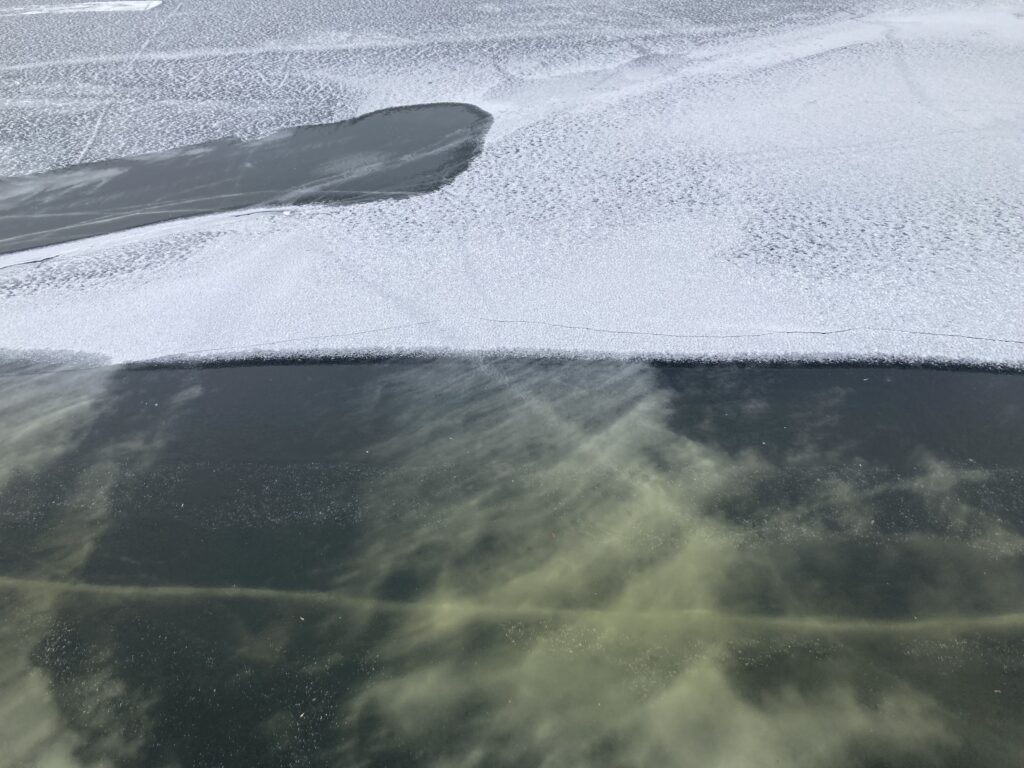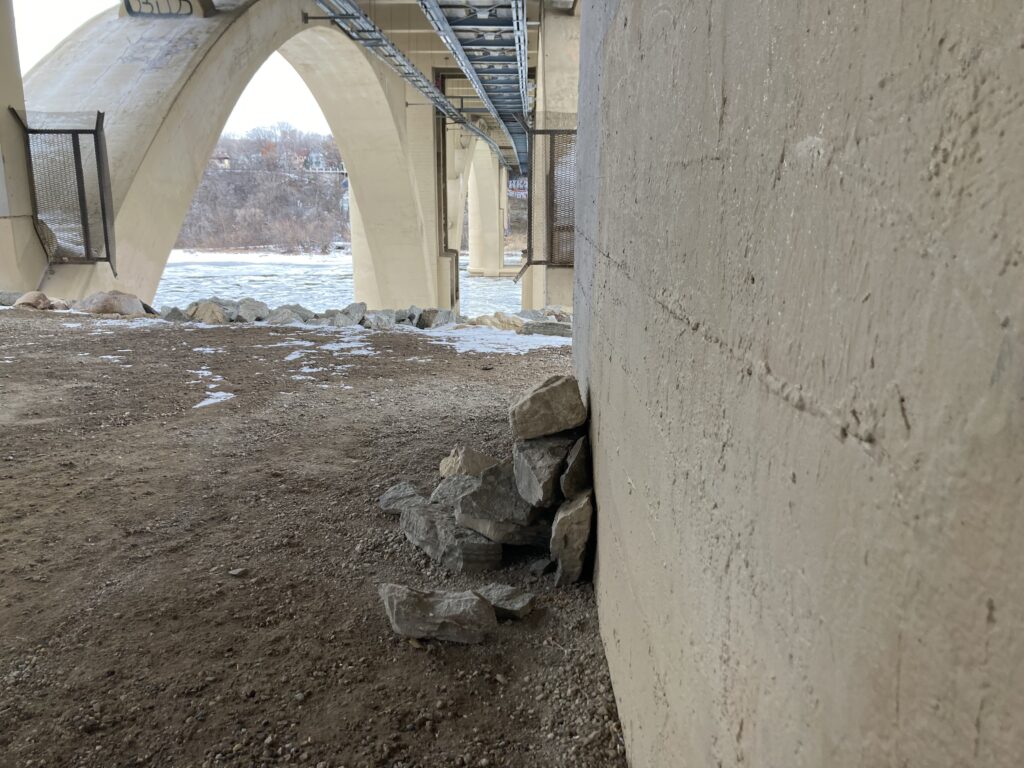2.5 miles
2 trails
73 degrees
dew point: 64
A late start, almost 10 am. Hot! A beautiful summer morning. Sun, soft shadows, sprinkling water, green, blue. I didn’t hear it, but it rained last night. Puddles and mud on the winchell trail. The river was brown and still.
overheard: a counselor to a group of camp kids taking a nature walk — be careful not to brush up and against anything! if you see poison ivy, don’t touch it!
Walkers, runners, bikers. No rowers or roller skiers. A strange sight near the crosswalk to the river trail: a stuck semi at a strange angle — the cab going one way, the trailer the other. What happened?
Above the trail was hot and dry, below slick, slippery, shaded. Voices drifting down. Shadows shifting. Dripping, rustling.
I chanted in triple berries, trying to keep my left and right foot strikes even. Soon, I’d like to pull out my phone and record my running — is it steady, or could I have some strange hitch I’m not aware of?
Was thinking about my colorblind plates again and what feelings taking and failing that test evoked. The snellen chart feeling is anxiety, uncertainty. The amsler grid, more curiosity and wonder and validation/recognition. The Ishihara Colorblind plates? A door opening — not only sudden awareness but a shifting and passing through something that, before, had only lived inside my head. A new understanding.
I was thinking about the dots in the plate. Dots. Circles. Loops. Os.
opening
outsider
outline
Ordovician onlooker
outset
oncology
offering
other
opinion
oath
ornithology
Ooo
ooze
odd
old
obstinate
outsized
ovulation
owl
osprey
oblivion
octogon
opened
occupy
orbit
organic
outcast
official
obvious
oracle
occipital
oak
overt
O!
oof
ointment
oddity
omen
or
outfield
outrage/ous
ostrich
ossify
outage
outstanding
open
online
orifice
onset
organs
outer limits
ophthalmology
olfactory
organization
orange
orchard
Oh!
oaf
ornamental
odor
obscure/d
orphaned
occult
opt/ion
octopus
out of control
outlet
outdoors
For more O inspiration, I’m looking to O/ Claire Wahmanholm. I posted it on here back on 12 june 2020. Here are some of her Os:
once
oil
overgrown
ore
only
oblivion
outdated
operation
opus
olive
obelisk
origin
overrun
oxygen
oared
octave
oval
observation
oculus
oven
ochre
The O lines from The Manic Depressive’s Alphabet / Anahita Monfared:
O is overprescribed! Four years on 250 mg of lithium and four on 250 mg of seroquel, all before you can legally drink
And Rita Dove’s Os that open Ode to My Right Knee:
Oh, obstreperous one. Ornery, outside of ordinary. . .
Does this help me to get any closer to figuring out what to do with my colorblind test? Maybe. Regardless, it was fun!
before the run
Today’s morning reading-while-drinking-coffee was wonderful. Here are some things I encountered:
one
hey, I get it. But look! how much pleasure is on the other side of that which only momentarily torments you! Think about the miracle of the other side, if you can get there, and you can! I get it! There is much we have to do to keep ourselves alive! Much of it mundane and some of it displeasing, but sunsets are cool and if you do enough of the mundane you get to see one of those from time to time! . . . Imagine the other side, the next moment, the thing that awaits beyond what exhausts you!
@nifmuhammad / Hanif Abduraqib
What luck to be alive at the same time as Hanif Abduraqib. So wise and loving. For years, I have been monitoring, imagining, writing about the other side in this log. It’s a real place: the opposite side of the gorge, usually the east side because I run on the west side more. My mother was born and raised on that other side. And, it’s an imagined place — a view, a vista, open space for breathing and being otherwise; the moments when, I don’t want to stop running.
two
Erin Dorney’s project, Question the Body. Very cool!
three
The Manic Depressive’s Alphabet / Anahita Monfared
About this Poem
“In concussion recovery therapy, there is an exercise where you must go through the alphabet, and list words that correspond with the letters as you go. Each round, you are given a theme. These themes can include names of people, cities, countries, foods, colors, and more. Doing this week after week, as I rewired my brain, I couldn’t help but think of the learned alphabets unique to every individual—the ones we inherit, the ones we claim, [and] the ones we try and run away from. From there, I wrote into one of my loudest alphabets: manic depression.”
The alphabets we inherit, we claim, we try and run away from. Wow!
swim: 2.5 loops (5 cedar lake loops)
cedar lake open swim
74 degrees
A little windier and choppier today. A current in the lake was pushing everyone swimming west to the wrong side of the buoy. By the fourth and fifth laps, I had finally figured out how to stay on course. I kept noticing the sky. First it was blue with only a few clouds. Then half of it was blue, the other half darker. By the last lap: gray. When I reached the shore I realized that it was raining. I had no idea!
No scratchy vines or clear bubbles. No flashes of fish or crazy kayaks. No planes or birds or dragonflies. All I remember is opaque water and occasionally sighting the orange dots and yellow and pink safety buoys tethered to torsos. Oh — and someone/something touching my calf. Most likely another swimmer.
I didn’t think about much as I swam except 1 2 3 4 5 breathe 1 2 3 4 5 breathe. I felt how my right arm has been getting stronger as I swim more and that I could use my tricep to move higher and faster through the water. I was irritated by some swimmers. Raced a few others, most likely without them knowing I was.

